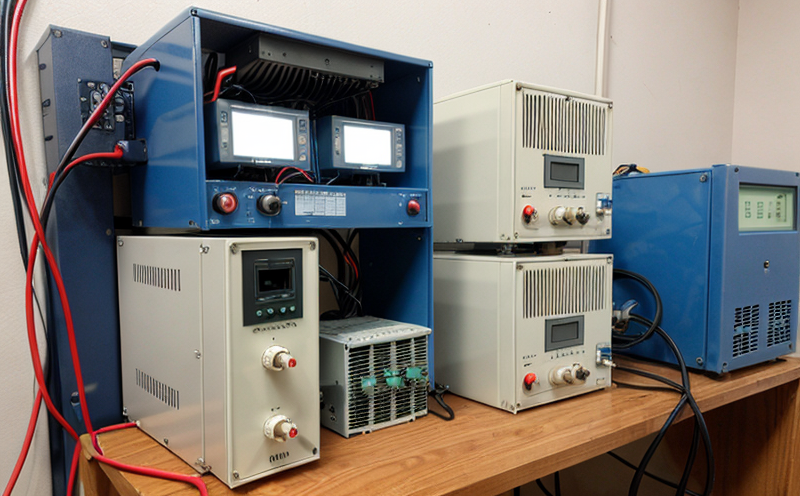IEC 63064 Testing of Railway Electrical Drives
The IEC 63064 standard is pivotal in ensuring the safety and reliability of railway electrical drives. These systems are integral to modern rail transportation, providing efficient power transmission from the overhead catenary system or third rail to the locomotive's traction motors. Compliance with this standard ensures that these critical components meet stringent international criteria for performance, durability, and safety.
The IEC 63064 series covers various aspects of railway electrical drives, including design, installation, operation, and maintenance. This testing is essential in identifying potential weaknesses or hazards that could compromise the integrity of the system during normal service conditions or in emergency situations. By conducting these tests, we ensure that each component operates within specified limits, preventing failures that could lead to significant disruptions in rail operations.
The IEC 63064 testing protocol is designed to simulate real-world operating conditions as closely as possible. This includes environmental factors such as temperature variations, humidity levels, and mechanical stresses that the drives encounter during their lifecycle. The tests are conducted using specialized equipment and calibrated instruments that can accurately measure key parameters like voltage, current, power factor, efficiency, and thermal performance.
During testing, specimens undergo a series of steps to ensure they meet all specified criteria. Specimen preparation involves cleaning and inspecting components for any defects or anomalies before they are placed into the test chamber. Once prepared, specimens are subjected to controlled environmental conditions that mimic actual field usage scenarios. This ensures that any issues identified during testing can be attributed accurately to specific operational parameters rather than external variables.
The primary goal of IEC 63064 testing is not just compliance but also continuous improvement. By identifying areas where current designs or manufacturing processes fall short, engineers can refine future iterations of railway electrical drives to become more robust and efficient. This iterative process helps maintain high standards across the entire industry while fostering innovation through rigorous quality assurance practices.
Compliance with IEC 63064 also carries significant implications for regulatory bodies responsible for overseeing rail safety. Authorities rely on consistent adherence to these standards when evaluating new technologies or modifications proposed by manufacturers. Meeting this requirement demonstrates commitment to best practices and enhances credibility among stakeholders involved in railway operations.
In summary, IEC 63064 testing plays a crucial role in safeguarding public safety while promoting technological advancement within the rail sector. Through meticulous evaluation of electrical drives under realistic conditions, we contribute towards creating safer, more reliable transportation networks worldwide.
Why It Matters
The importance of IEC 63064 testing cannot be overstated given its direct impact on public safety and operational efficiency in railways. Non-compliance can result in equipment failures leading to accidents, delays, or even derailments – all of which pose serious risks not only to passengers but also to maintenance personnel working alongside moving trains.
- Enhanced Safety: Ensures that electrical drives function safely under all expected conditions, minimizing the risk of malfunctions during critical phases like acceleration and braking.
- Better Maintenance Planning: Identifies potential points of failure early on so maintenance teams have sufficient time to address them before they become major issues.
- Increased Efficiency: Helps optimize power consumption by ensuring that drives operate at maximum efficiency, thereby reducing energy costs and environmental impact.
- Regulatory Compliance: Demonstrates adherence to international standards recognized globally, enhancing trust among regulatory bodies and fostering smoother interactions between different countries' railway systems.
Avoiding non-compliance saves time and money in the long run by preventing costly recalls or redesigns after products have already been introduced into service. It also promotes better relationships with customers who appreciate knowing that they are investing in safe, reliable equipment backed by rigorous testing protocols recognized worldwide.
Quality and Reliability Assurance
Ensuring the quality and reliability of railway electrical drives is paramount for maintaining optimal performance standards. This section highlights some key aspects involved in assuring these qualities through comprehensive IEC 63064 testing:
- Environmental Testing: Conducting tests under various environmental conditions such as temperature, humidity, altitude, and vibration to simulate real-world scenarios.
- Load Testing: Subjecting specimens to varying levels of load to assess their ability to handle peak demands safely and efficiently.
- Vibration Analysis: Monitoring vibrations during operation to detect early signs of wear or damage that might otherwise go unnoticed until it's too late.
- Thermal Cycling: Exposing components to rapid changes in temperature to evaluate their resistance against thermal shock without compromising functionality.
Through these rigorous tests, we ensure not only compliance with international standards but also continuous improvement of product quality. Our laboratory follows best practices outlined by relevant organizations like ISO and ASTM to maintain credibility within the industry.
Competitive Advantage and Market Impact
Adhering to IEC 63064 testing provides numerous advantages for manufacturers, operators, and other stakeholders in the railway sector. Firstly, it differentiates participants who commit themselves fully to upholding these high standards from those who may cut corners or bypass necessary procedures entirely.
Achieving compliance enhances brand reputation by demonstrating a commitment to excellence. This is particularly valuable when bidding for contracts or seeking partnerships with reputable organizations worldwide. Moreover, it opens doors to new markets where stringent regulatory requirements are enforced.
For operators, ensuring that their fleet meets these standards translates directly into enhanced safety and reliability. Passengers benefit from smoother rides without interruptions caused by unexpected breakdowns or malfunctions. Additionally, maintenance costs decrease due to fewer failures requiring extensive repairs or replacements.
The broader market benefits significantly as well since consistent adherence to international standards promotes interoperability between different systems across various countries. This fosters a more integrated global railway network capable of handling increasing passenger and freight volumes efficiently.





